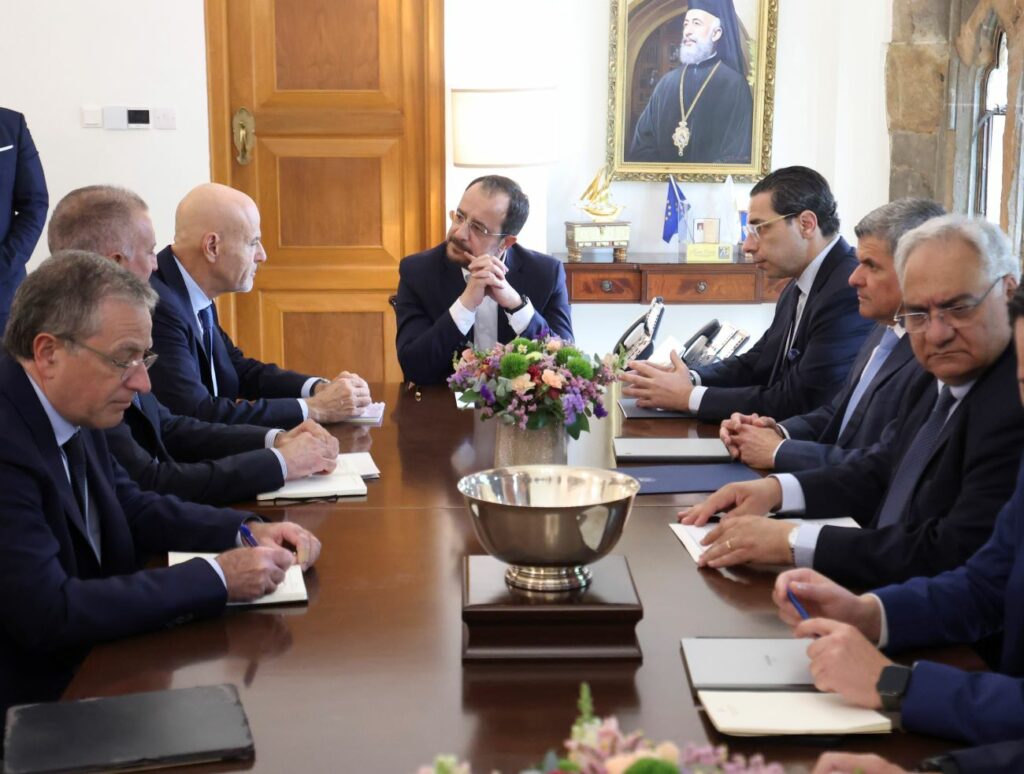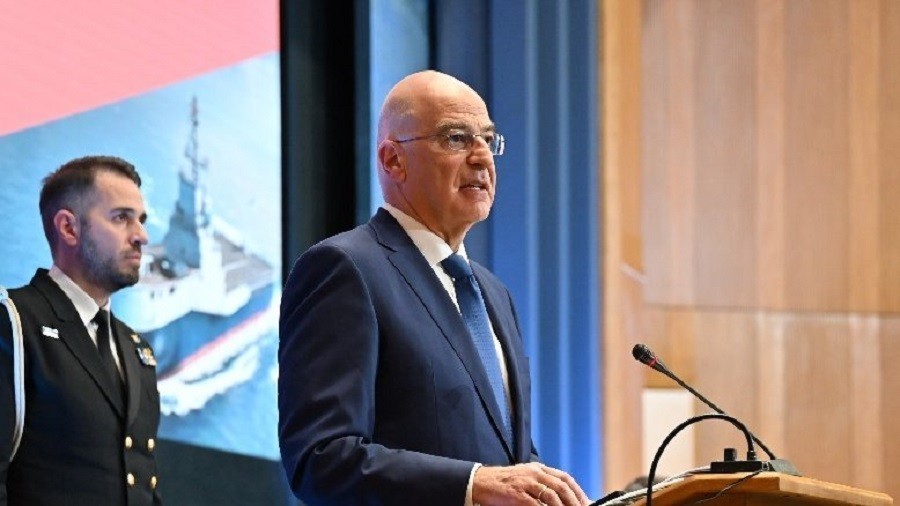
Kotzias hopes Ankara will be sufficiently wise to prepare a Conference on Cyprus
The Greek side consistently supports the continuation of the inter-communal negotiations for a Cyprus settlement, Greek Foreign Minister Nikos Kotzias said on Monday, noting that it was Athens which insisted from the beginning for an open-ended negotiation.
Kotzias expressed hope that at a certain point Turkey will be sufficiently wise “so that we will be able to prepare an international conference in Geneva on the issue of security, with a view to abolish the 1960 Treaties of Zurich and London for Cyprus.” (Treaties of Alliance and Guarantee).
In statements after a meeting he had in Athens with the UN Secretary General`s Special Adviser on Cyprus Espan Barth Eide, Kotzias said that Ankara has never accepted until now to substantially discuss the issue of guarantees and security, and faces the Cyprus issue on the basis of its own interests.
Kotzias noted that part of the Cyprus territory is occupied by a third country and that the settlement of the Cyprus problem, by diplomatic means and measures, must restore the unity of the island, allocating maximum rights to all citizens of the island, irrelevant of which community they come from, and at the same time providing maximum security to everyone, especially the Greek Cypriots.
He also said that Greece deals only with the international aspect of the Cyprus problem, mainly with the issue of guarantees and security. He said that this issue is linked with the need and demand for Turkey to realize that it must withdraw its troops from Cyprus and that it cannot maintain guarantee and intervention rights over the island.
He noted that unfortunately Turkey continues to put forward its own needs and not Cyprus` and its communities` needs. He recalled that Ankara has put on the table the issue of the four freedoms for its citizens, which concerns its relation with the EU and not the Cyprus problem, as he noted.
Kotzias underlined that Turkey has never responded to the proposals which Greece has made as regards the international aspect of the Cyprus problem. “It just refuses to substantially discuss this issue with us,” he noted, adding that Turkey must stop seeing the Cyprus problem as an issue concerning its geopolitical interests, or its interests towards the EU.
“It must accept that Cyprus must become and exist as a normal state, member of the EU and the UN,” he added.
Responding to questions, Kotzias stressed that the Turkish army must leave Cyprus, noting that as happens in such cases a timeframe for the army`s withdrawal is required.
He noted that once the two Treaties are abolished there could be a Friendship Agreement among the countries who are interested in the development of Cyprus and its protection from third parties.
On the 26th of May, Eide issued a written statement saying that despite serious efforts to overcome their differences regarding the modalities for meeting in Geneva, the leaders in Cyprus were unable to find common ground.
“Without a prospect for common ground, there is no basis for continuing this shuttle diplomacy,” he pointed out.
Cyprus has been divided since 1974 when Turkey invaded and occupied its northern third. UN-led talks between Anastasiades and Akinci have been underway since May 2015, aiming to reunify the island under a federal roof.
Eide says decision on troops and guarantees has to be taken when all sides are fully prepared
The final decision about troops and guarantees in Cyprus cannot be taken now in Geneva, but has to be taken when all sides are fully prepared, UNSG Special Envoy Espen Barth Eide has said.
In statements to the press in Athens on Monday, after a meeting with FM Nikos Kotzias, Eide said that Cyprus talks are going through a difficult phase because, in spite of the fact that we have made significant progress on so many chapters, and in spite of the fact that both of the leaders, are both of the view that it would be good to reconvene the International Conference on Cyprus in Geneva, “we have not been able so far to agree on the modalities, and the structure and the order of things to be discussed in a possible new Geneva Conference”.
Eide pointed out that the UN is not giving up, and he is in a round of conversations with the governments of the guarantor powers, Greece, Turkey and the UK, to continue to prepare “as if we will be able to go to Geneva, because we need to be ready”.
UNSG Special Envoy said that at the end of the day the key decision has to be made in Cyprus by the two leaders, “about whether they are willing to try a common platform for a new Geneva Conference”.
“This is top priority for me now. The focus is not so much on substance, but very much on the way to organise it, because behind this agreement on agenda there are always political difficulties”, he underlined.
Eide said that the UN are ready and he has the feeling that the guarantor powers, in principle, are ready, as they were last time in January, adding that more thinking has happened, even on those issues that pertain to the guarantor powers, which includes and predominantly deals with security and guarantees, “but we’re not there”.
Replying to a question, UN Envoy said that the conversation on the international aspect of this Conference has to continue but he clarified that the UN “will not call a Conference on Cyprus against the will of the two sides in Cyprus and this is something we are doing in parallel to the work we are doing back in Nicosia”.
Invited to reply to a question whether the guarantor powers must exert pressure on the two sides, Eide replied that this is up to the guarantor powers and that he is not asking them to put pressure on anybody.
“But I want to share with them that I am worried, and that I am more worried than I have been at any other time over these last three years that the process is in serious trouble, and I very strongly feel, and I have the confirmation of this, that it is not in the interest of Greece, I don’t think it is in the interest of Turkey, or any other international players, that this process fails”, he pointed out.
Eide said that even if it is a Cypriot process, first and foremost it has to do with the coming together of a divided country and two communities cooperating again, the international ramifications of a non-solution can influence obviously Greek-Turkish relations, Turkey-EU relations, and generally relations in the eastern Mediterranean.
“We know that this is happening at a time when a lot of other things are difficult in this neighbourhood, and also where there are opportunities for cooperation around energy, but opportunities that are best managed in the context of a settlement, rather than in the context of deep divisions”, he said.
Asked by the press if one side in Cyprus is more responsible for the dead -end, UN Envoy recalled what he said on Friday, that we were not able to find common ground.
“Because what I was trying (was) to take the two positions, bringing them closer, I thought that I was on good track on Wednesday, but on Thursday it became more difficult again, and up to now we don’t have a shape on which to go to Geneva. There is a lot of blame-game that goes around in Cyprus that worries me, because I think they might eventually find a way back and then they will probably regret all that mutual blame. So I am definitely not going to add any blame, there is enough of that already going around, at least not at this point. Of course, later I will have to have a comprehensive report to the Security Council. I am briefing them, and the Secretary General almost on a daily basis now. But any kind of final judgement is premature at this point“, he pointed out.
Replying to a question whether he will be candidate in his country`s elections next Fall, Eide said that he is fully focused on Cyprus talks, and will try and continue to do his best and what he thinks is right. “If at some point I discover there is no hope, I will draw the obvious conclusions from that as well“, he added.
Eide said, replying to another question, that the two sides in Cyprus and almost everybody who has been following this (the Cyprus issue) for years, seem to be in agreement that the two leaders, “have brought this process much further than any other pair of leaders before them”.
“So I feel that we at the UN have been contributing to that, but first and foremost it’s a leader-lead process, and we are really very-very close (to a solution). We are actually more close than most people seem to understand. Because on at least 5 of the 6 issues, the leaders see eye-to eye, and if a problem isn’t solved, they know more or less what it will look like at the end of the day”, he said.
Eide added that we still have this critical issue of security and guarantees, where over the last half year a number of ideas have been developed, and the sides have shown interest in them, “but they are still so far, and not committed to them“.
He went on to say that this is exactly the conversation we need to have with the guarantor powers in parallel to the talks in Cyprus.
Eide said that the Greek government, and Mr. Kotzias in particular, “has been very instrumental in developing some of the ideas we have been discussing in many meetings here, and I think I will continue to have this conversation“.
UNSG Envoy said that they did not discuss about Kotzias` letter to the SG because, he pointed out, it’s much more important to try to solve the Cyprus problem, and Greece as a guarantor has a role to play.
“And I appreciate very much that we had the opportunity to meet just now, because the process is in a critical phase and we need all forces to do their utmost. Obviously, Turkey and Greece have different views on certain issues, but it is to my strong knowledge from many conversations here and in Ankara, that both of them would like to see a solution to the Cyprus problem”, he added.
He further said that if they have the same goal, even through different means and parameters, his job is to try and see if we can gradually reconcile these. “And on the chapter of securities and guarantees, the answer is that it requires change. But in order to facilitate that change, we need to have a discussion of what we will put in place. And this is the discussion I will really try to have now”, he pointed out.
CNA – Christos Michaelides – Greece/Athens 29/05/2017 18:58

